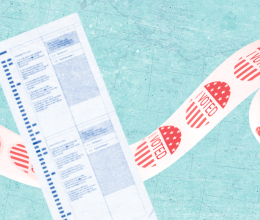As part of its annual voter roll maintenance process required by the National Voter Registration Act, the Ohio Secretary of State was cancelling the registrations of voters who voted infrequently. Specifically this purge protocol, the “Supplemental Process,” targeted voters who did not vote in two consecutive federal elections, and sent them a notice asking them to inform the Secretary of State that they had not changed address since they last voted. If a voter did not respond and did not engage in voter activity for the subsequent four years, the voter’s registration would be cancelled with no further notice. Voters purged as a result of this process often did not see or understand the notice, and did not realize they had been purged. They learned of their purged status only when they came to the polls to vote in a subsequent election and were informed that they were not registered. At this point, they were forced to vote provisionally—a vote that does not count when the voter is not registered.
This annual purge resulted in the cancellation of hundreds of thousands of eligible voters who voted infrequently. The ACLU of Ohio and co-counsel Demos, a progressive public policy organization that focuses extensively on voting rights, brought suit to halt the Supplemental Process and to restore the voter registrations of those unlawfully purged on behalf of three plaintiffs: two organizations that work to register voters, the A. Philip Randolph Institute and the Northeast Ohio Coalition for the Homeless, and one individual who had been illegally purged, Larry Harmon.
Legal Theory
The Secretary of State violated the National Voter Registration Act (NVRA) when he purged voters based on their failure to vote. The NVRA permits registration cancellation based only on a voter’s change of address, death, or other enumerated reasons that do not include failure to vote. In fact, the NVRA explicitly prohibits voter purging based on the failure to vote.
Status Update
On December 17, 2015, we sent a pre-litigation notice letter on behalf of the Ohio A. Philip Randolph Institute, a civil rights-labor organization, to Ohio Secretary of State Jon Husted. In the letter, we urged the state to stop its unconstitutional practice of removing voters from its registration rolls for non-voting.
On January 21, 2016, we met with officials from the Secretary of State’s office and the Constitutional Section of the Attorney General’s office to discuss the concerns raised in our letter and began attempts to reach an agreement. As part of an attempt to address the issues that we raised, Secretary Husted issued a press release on February 1, 2016 encouraging voters to confirm and update their registration status prior to the close of registration on February 16, 2016, “particularly if a voter has not voted in a long time, changed their name or changed their residence.” In addition to the A. Philip Randolph Institute, NEOCH (The Northeast Ohio Coalition of the Homeless) joined as a client/plaintiff, and we filed a Notice Letter on its behalf.
On April 6, 2016, the ACLU and Demos filed a Complaint in the U.S. District Court for the Southern District of Ohio, followed by a Motion for a Temporary Restraining Order and Preliminary Injunction. The Motion asked the Court to require Secretary Husted to stop the annual purge process and to restore all unlawfully purged voters to the voting rolls. Judge George C. Smith was assigned to the case. Mediation was attempted, but failed. The Complaint was amended to add individual plaintiff Larry Harmon.
On June 29, 2016, after expedited discovery and briefing, Judge Smith ruled in favor of Defendant Husted. The ACLU and Demos appealed and successfully moved for an expedited schedule before the Sixth Circuit.
On July 26, 2016, the Sixth Circuit heard oral arguments in the case. On September 23 the Court ruled that the Supplemental Process violated the NVRA, reversing the decision of the district court. The Court’s opinion adopted our interpretation of the NVRA’s prohibition on removing voters for failure to vote, and held that the Supplemental Process unlawfully used failure to vote to trigger a process that ultimately resulted in voters’ removal from the rolls. However the Sixth Circuit did not issue a remedy, instead remanding the case to the lower court to do so.
On October 13, 2016, the Secretary filed a motion to implement his proposed remedy. We filed an emergency motion for a temporary restraining order, asking the Court to ensure that Ohio voters who were unlawfully purged would be able to have their votes counted in the November 2016 election if they appeared in person to vote or voted by mail.
On October 19, the Court ordered favorable relief as to the November 8 election. It ordered the Secretary of State to count the provisional ballots of voters who were unlawfully purged in 2011 or later, as long as the voter was otherwise eligible to vote and had not moved to a different county. The Court also ordered the Secretary to send a notification by mail to any purged voter who requested an absentee ballot, explaining that the voter could vote in person by provisional ballot and that their vote might count.
We subsequently negotiated further relief with the Secretary for two subsets of voters who had not been covered by the Court’s order: ill or disabled voters and military and overseas voters who had been unlawfully purged, but who needed to vote by mail. On October 25, 2016, the Court issued an order requiring county boards of elections to hand-deliver provisional ballots to unlawfully purged voters who had personal illnesses, physical disabilities, or infirmities. On November 5, 2016, the Court ordered that overseas and military voters who had been unlawfully purged must be able to vote provisionally by mail. Collectively, these orders are referred to as the “APRI Exception.”
Following the election, on November 21, 2016, the district judge granted a third joint motion to extend the relief to a December 6 special election.
On January 6, 2017, the District Court set dates for discovery and briefing in the permanent remedy stage of the litigation. We agreed to multiple protective orders limiting our distribution of documents that we obtained from Defendant or third parties during discovery.
In the meantime, the Secretary of State’s office filed a petition for writ of certiorari in the U.S. Supreme Court, which we opposed. Discovery continued while parties waited to learn if the Supreme Court would hear the case.
On April 18, the parties submitted a joint proposed order to the district judge extending the APRI Exception to the May 2 Special Primary election.
On May 30, the U.S. Supreme Court granted the Secretary’s petition for writ of certiorari. Parties agreed that, while the Supreme Court reviewed the case, the lower court proceedings would be stayed, that the APRI Exception would be extended, and no voters would be purged under the Supplemental Process
Oral arguments took place on January 10, 2018. On June 11, 2018, the Supreme Court reversed the Sixth Circuit ruling, holding that Ohio’s Supplemental Process is permissible under the NVRA’s Failure-to-Vote clause. The stay on the District Court proceedings was lifted and the interim remedies vacated.
There remained an issue of registrants who were purged pursuant to Ohio’s form of confirmation notice, which did not meet with the requirements of the NVRA. On July 27 the Court held a settlement conference to resolve this remaining claim. The parties did not reach a full settlement, but entered an interim agreement that extended the APRI Exception to the then-upcoming August 7 special election.
After further mediated negotiations, we could not reach an agreement providing continuing relief for voters who were purged pursuant to defective notices. Therefore, the parties are litigating as to the proper final remedy. The Court denied our September 14 Motion for Final Judgment, and we appealed to the Sixth Circuit, also filing an Emergency Motion for Injunction Pending Appeal. On October 31 the Court granted the emergency relief we requested, extending the APRI exception for the November 2018 election.
We filed our brief with a request for oral argument on January 31, 2019. In the meantime, opposing counsel has agreed to enter mediation to resolve the case. On March 11, the Secretary of State stipulated to extend the APRI exception for the May 7, 2019 primary election.
After obtaining several extensions while parties pursued mediation, Appellee Ohio Secretary of State filed its brief on July 8 and a briefing schedule was set. Parties subsequently reached a settlement agreement and stipulated to dismissal on August 30, 2019.
Among other details, the settlement:
• Continues the APRI Exception – which the Secretary had previously announced he was cancelling – through the end of 2022. For this period, the Exception is also expanded to include more voters, including those who had last voted in 2007 (who had received their notices as far back as 2011). And the Exception is further expanded to include not only purged voters who still live at the same precise address, but also voters who still live in the same county.
• Expands the reforms that the Secretary had voluntarily directed (such as the last chance notices) and embeds them in the settlement agreement, so that they cannot be retracted.
• Provides that the Secretary will publish data so that usage of the APRI exception can be monitored.





